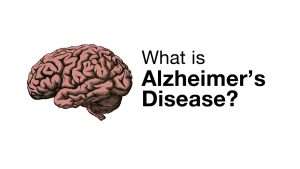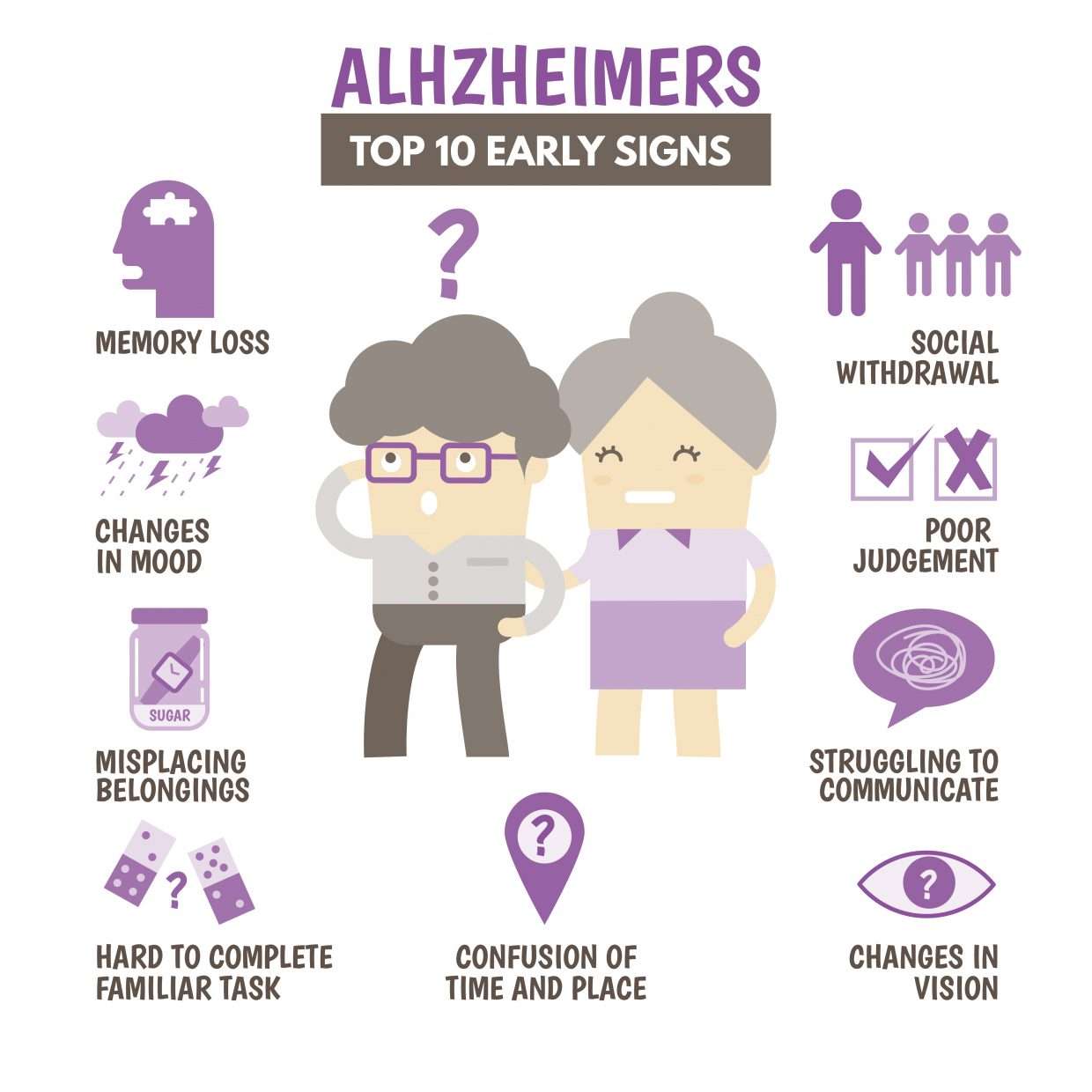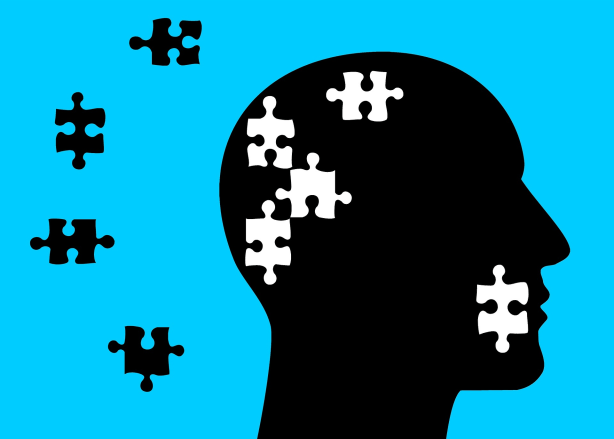It’s hard to think about a time when Alzheimer’s wasn’t a part of our lives. Whether it was a loved one who we’ve lost to the disease or are currently caring for, it seems like this illness is everywhere. The good news is that there are ways to prevent Alzheimer’s from occurring in the first place! In this blog post, we will discuss some tips and tricks on how you can keep your mind healthy and sharp and reduce your risk of developing Alzheimer’s.
Contents
What Is Alzheimer’s?
 A lot of people are not familiar with Alzheimer’s disease. It is a form of dementia that results in memory loss and impaired thinking skills. The progression of the disease can be gradual or rapid, but it always leads to death.
A lot of people are not familiar with Alzheimer’s disease. It is a form of dementia that results in memory loss and impaired thinking skills. The progression of the disease can be gradual or rapid, but it always leads to death.
Alzheimer’s is caused by a build-up of plaques and tangles in the brain. These plaques and tangles block communication between nerve cells, eventually killing them. Alzheimer’s is not a normal part of aging, but most people with Alzheimer’s are over the age of 65. It is the sixth leading cause of death in the United States.
There can be some confusion between Alzheimer’s and dementia. Dementia is an umbrella term that describes the symptoms of mental decline. Alzheimer’s disease is a type of dementia, but not all people with dementia have Alzheimer’s. There are two other types: vascular dementia and Lewy body dementia.
Signs and Symptoms of Alzheimer’s

There are many signs and symptoms of Alzheimer’s. Some of these are:
Memory Loss
Memories of the past may start to fade, and people with Alzheimer’s may have difficulty remembering recent events or conversations.
Confusion
People with Alzheimer’s may become confused about where they are, who they are talking to, or what time it is.
Behavioral Changes
People with Alzheimer’s may change their moods more easily, become agitated, depressed, or paranoid. They may also lose interest in things they used to enjoy and have difficulty completing tasks.
Physical Problems
People with Alzheimer’s often experience changes in their physical abilities. They may become weaker and unsteady on their feet, have trouble swallowing, and develop a poor appetite.
Causes of Alzheimer’s

There are many causes of Alzheimer’s. Some of these are:
Genetics
Alzheimer’s is caused by a combination of genetics and lifestyle choices. If someone in your family has Alzheimer’s, you are more likely to get it too. This can be due to a combination of genes passed down from your parents or lifestyle choices you make.
Environment
Exposure to environmental toxins, like lead and mercury, can increase the risk of Alzheimer’s. Poor diet and lack of exercise may also contribute to the development of the disease.
Stress
Chronic stress can increase the risk for Alzheimer’s. This is because stress hormones can damage nerve cells in the brain. It can also affect the immune system, which in turn affects brain function.
Lack of Sleep
Not getting enough sleep can increase your risk for Alzheimer’s disease. Sleep is important for memory consolidation and retrieval as well as motor skill learning. Lack of sleep has been linked to poor cognitive performance later in life, so make sure you get some shut-eye!
Negative Impacts of Alzheimer’s

There are many negative impacts of Alzheimer’s. Some of these are:
Financial Costs
The financial cost is one of the biggest impacts of Alzheimer’s. The disease can be expensive to treat and it often results in lost income for the person with Alzheimer’s and their caregivers.
Depression
Depression is a common side effect of Alzheimer’s. People with the disease may feel isolated and alone, and they may lose interest in activities they used to enjoy.
Caregiver Stress
Caring for someone with Alzheimer’s can be very stressful. It is often difficult to manage all the responsibilities that come with caregiving. Caregivers also need to make sure they take care of themselves by getting enough sleep and exercise.
Anxiety
Anxiety is a common symptom of Alzheimer’s. People with the disease may be afraid to leave their homes or go out in public because they feel like people are staring at them and judging them negatively.
Tips for Preventing Alzheimer’s
There are many things you can do to prevent Alzheimer’s. Some of these are:
Get Regular Exercise
 Regular exercise has been shown to reduce the risk of developing Alzheimer’s by up to 50%. You should get at least 30 minutes per day, five days a week, but it doesn’t have to be all at once! Try taking three ten-minute walks instead if that makes it easier for you. This will help your heart health as well as improve brain function over time so do not skip this step!
Regular exercise has been shown to reduce the risk of developing Alzheimer’s by up to 50%. You should get at least 30 minutes per day, five days a week, but it doesn’t have to be all at once! Try taking three ten-minute walks instead if that makes it easier for you. This will help your heart health as well as improve brain function over time so do not skip this step!
Eat Balanced Diet
Eating a balanced diet is important for preventing Alzheimer’s. You should eat plenty of fruits and vegetables, whole grains, lean meats like chicken or fish, and low-fat dairy products like yogurt or milk. Limit sugary drinks such as soda pop too because these can increase your risk for obesity which in turn increases the likelihood that you will develop diabetes mellitus type II (DMII). This also means avoiding fried foods which are high in saturated fats so no french fries either please.
Stay Hydrated
 You should always aim to drink six to eight glasses of water per day. This will help keep your body and brain functioning at their best. When you’re dehydrated, it’s harder for your brain to function properly. This can lead to confusion and memory loss.
You should always aim to drink six to eight glasses of water per day. This will help keep your body and brain functioning at their best. When you’re dehydrated, it’s harder for your brain to function properly. This can lead to confusion and memory loss.
Practice Stress Management Techniques
Stress can have a negative impact on your mental health, which in turn makes you more likely to develop Alzheimer’s disease. Try relaxation techniques like meditation or yoga if stress is an issue for you. These will help lower blood pressure levels so they’re good even if there aren’t any immediate effects right away! Be sure not to overdo it with either though as some people find that too much of anything isn’t always great either so try switching off between different activities throughout the week instead.
Maintain Lifestyle
 Lifestyle is another important factor in preventing Alzheimer’s disease. Make sure you get plenty of sleep, eat a healthy diet, and stay active. These things will help keep your body and brain functioning at their best. Sometimes it’s hard to do all of these things, so try doing just one or two each day.
Lifestyle is another important factor in preventing Alzheimer’s disease. Make sure you get plenty of sleep, eat a healthy diet, and stay active. These things will help keep your body and brain functioning at their best. Sometimes it’s hard to do all of these things, so try doing just one or two each day.
Get Mental Stimulation
Stimulating your brain with puzzles and games is a great way to prevent Alzheimer’s disease. It doesn’t matter what type of activity it is—it could be reading books, doing crossword puzzles, playing Sudoku (a number-based puzzle), taking classes at the local community college for seniors, etc. Just make sure that you’re getting some sort of mental stimulation every single day.
Avoid Substance Abuse
 You can prevent Alzheimer’s disease by avoiding substance abuse. It is important to not use tobacco products or drink alcohol in excess because these substances can damage your brain cells and lead them towards dementia symptoms like memory loss (dementia). This can also be caused by some medications such as benzodiazepines and barbiturates which have been known to cause memory impairment when taken for extended periods of time with no breaks between doses.
You can prevent Alzheimer’s disease by avoiding substance abuse. It is important to not use tobacco products or drink alcohol in excess because these substances can damage your brain cells and lead them towards dementia symptoms like memory loss (dementia). This can also be caused by some medications such as benzodiazepines and barbiturates which have been known to cause memory impairment when taken for extended periods of time with no breaks between doses.
Quit Smoking
Smoking is bad for your health, but did you know it can also increase the risk of Alzheimer’s disease? You should quit smoking if possible because this habit has many negative effects on both body and mind! It causes lung cancer which kills more people each year than any other form of cancer; cardiovascular disease including heart attack, stroke, or clogged arteries leading to high blood pressure; emphysema that destroys air sacs in the lungs making them unable to work properly causing shortness of breath chronic bronchitis where there’s constant coughing, mucus production, and wheezing; as well as diabetes mellitus type II which can cause nerve damage and affect your ability to see, smell, and taste properly.
Stay Social
 Staying social is important for preventing Alzheimer’s disease. This means staying connected with friends and family members, participating in group activities, and going to religious services regularly. All of these help keep you mentally stimulated and socially active. If you don’t have anyone to stay social with, there are plenty of online communities that you can join too!
Staying social is important for preventing Alzheimer’s disease. This means staying connected with friends and family members, participating in group activities, and going to religious services regularly. All of these help keep you mentally stimulated and socially active. If you don’t have anyone to stay social with, there are plenty of online communities that you can join too!
Use Technology Wisely
Technology can be a great way to stay connected with friends and family members, but it’s important to use it wisely. Don’t spend too much time on the computer or playing video games, as these can be addictive and potentially harmful. Instead, try using technology for short periods of time to stay connected with loved ones. This will help you avoid too much screen time which can have negative consequences for your health.
Get Pet
 Pets are great companions and they can also help prevent Alzheimer’s disease. Studies have shown that owning a pet reduces stress levels, provides social interaction and increases physical activity—all of which help reduce the risk of developing Alzheimer’s disease. If you don’t have a pet, consider adopting one from your local animal shelter. This can be a great way to get a pet and help out a homeless animal at the same time.
Pets are great companions and they can also help prevent Alzheimer’s disease. Studies have shown that owning a pet reduces stress levels, provides social interaction and increases physical activity—all of which help reduce the risk of developing Alzheimer’s disease. If you don’t have a pet, consider adopting one from your local animal shelter. This can be a great way to get a pet and help out a homeless animal at the same time.
Make Plan
It’s important to make a plan for your health. What are some things you want to do this year? Maybe it’s seeing the world, or maybe just spending more quality time with family members and friends. No matter what your goals may be, having them written down will give direction in life which can help prevent Alzheimer’s disease. Makin a plan will always be beneficial for everyone.
Conclusion
Alzheimer’s disease is a devastating illness that can rob someone of their memory and ability to function in everyday life. It is important for people who are at risk of developing this condition to make lifestyle changes now so they don’t end up with the symptoms later on down the road.
However, there isn’t just one thing you need to do in order to prevent Alzheimer’s disease – it takes multiple actions including exercise, eating healthy foods like fish or nuts every day while avoiding saturated fats from red meat and trans fats found margarine butter spreads; avoiding smoking cigarettes. You can also take help from outside if you need it. You can also contact us for more information related to this. We provide treatments on this and all related issues.
A Word From Therapy Mantra
Your mental health — your psychological, emotional, and social well-being — has an impact on every aspect of your life. Positive mental health essentially allows you to effectively deal with life’s everyday challenges.
At Mantra Care, we have a team of therapists who provide affordable online therapy to assist you with issues such as depression, anxiety, stress, relationship, OCD, LGBTQ, and PTSD. You can take our mental health test. You can also book a free therapy or download our free Android or iOS app.


